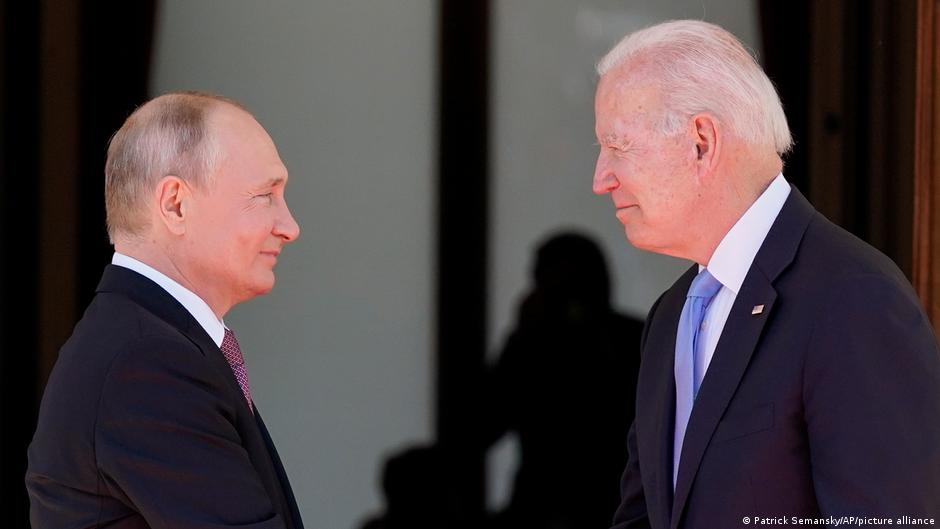Recent comments from US President Joe Biden suggesting that Russia would pay "a terrible price" and face devastating economic consequences if it invaded Ukraine have prompted an immediate reaction from the Kremlin.
In a video released on Rossiya 1 TV Channel, Kremlin spokesman Dmitry Peskov said that such statements harm what is already strained relations between Moscow and Washington, adding that any attempts to sanction Russia will have consequences.
"It is impossible to impose any restrictions on Russia and not to suffer (from them) yourself," Vesti.ru quoted Peskov as saying on Sunday. "Everyone in the world understands that."
He went further to say that immediately after Russian President Vladimir Putin and his American counterpart had a video call last week, in which the parties addressed the rising tension over Ukraine, American colleagues began speculating that Biden frightened Putin.
"That’s not true," Peskov stressed. "The conversation was mutually respectful. You can't talk to Putin any other way, he wouldn't have called then."
The Russian and US presidents had a two-hour discussion in a bid to ease tensions on the Ukraine border. With tens of thousands of Russian troops stationed along the Ukrainian border, Western officials warned that Russia could be planning an invasion of the former Soviet country. Russia has repeatedly claimed that it is free to move its troops within its borders and has no plans to attack Ukraine, yet, the US has threatened sanctions on an unprecedented scale if it does.
Peskov said that Putin had no particular grounds for optimism after speaking to Biden because of continued, and very serious differences between Russia and the United States over Moscow's so-called "red lines" which it does not want the West to cross.
According to a statement issued by the White House administration on December 7 following the Biden-Putin meeting, Biden voiced his concerns about the "escalation" of Russian troops near the Ukrainian border and warned that the US and its allies would be ready to impose sanctions if the situation escalates any further.
In response, Putin warned against "shifting the responsibility" to Russia, underlining that it was NATO that was engaged in "dangerous attempts to gain a foothold on Ukrainian territory, and building up its military capabilities along the Russian border," said a statement issued by the Kremlin.
The Kremlin has long opposed Ukraine's bid to join NATO, arguing that it would only exacerbate the situation. Russia has long criticized the deployment of NATO troops to Eastern Europe, up to Russia’s borders, which threatens its stability and may force Moscow to take extra measures to ensure its security.
Meanwhile, Ukraine has been trying to join the western military block in hopes of gaining protection against what Kyiv calls to be Russian aggression. Ukraine and Russia have been at odds since the 2014 crisis in Ukraine's southern and eastern regions. Ukraine accuses Russia of annexing the Crimean Peninsula that extends into the Black Sea. The Moscow-backed referendum held in March that year reportedly revealed that over 90 percent of Crimea's residents wanted the peninsula to be under Russian control. However, the vote was declared illegitimate by Ukraine, Western countries, and the United Nations.
Russia has also been accused of fueling conflict in Ukraine’s Donetsk and Lugansk regions and supporting the separatist regimes with weapons and troops. Moscow, however, has repeatedly denied those claims.
Tensions between the two countries aggravated in April after a massive buildup of Russian troops near Ukraine’s border. Russia did not deny the troop movements but insisted that Moscow had no intentions of threatening Ukraine. For two weeks, more than 10,000 servicemen, 1,200 units of equipment, as well as 40 warships were positioned in Crimea, in what Russia said was a part of a snap training exercise.







 Azerbaijan and Armenia started the process of demarcation of their border on Tuesday, with the installation of the first border markers based on ge...
Azerbaijan and Armenia started the process of demarcation of their border on Tuesday, with the installation of the first border markers based on ge...
 Armenian sappers commenced on Monday mine-clearance operations in the territories adjacent to the Saint Mary Church in village of Voskepar (Armenia...
Armenian sappers commenced on Monday mine-clearance operations in the territories adjacent to the Saint Mary Church in village of Voskepar (Armenia...
 Iran and Pakistan have signed eight cooperation documents in various fields, and agreed to strengthen ties to fight terrorism in the region.
Iran and Pakistan have signed eight cooperation documents in various fields, and agreed to strengthen ties to fight terrorism in the region.
 President Aliyev emphasized the critical role of the North-South Transport Corridor in fostering transport cooperation between Azerbaijan and Russi...
President Aliyev emphasized the critical role of the North-South Transport Corridor in fostering transport cooperation between Azerbaijan and Russi...



